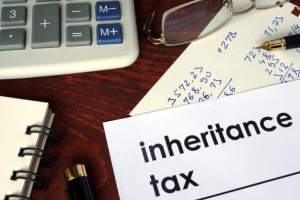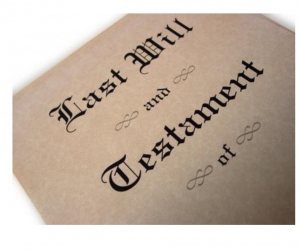National Estate Planning Awareness Week 2020: The Importance of an Estate Plan
National Estate Planning Awareness Week runs from October 19-25, 2020. First celebrated in 2008, this week highlights the importance of estate planning and its vital role in your overall financial health. By some estimates, up to 50% of Americans have not prepared any estate planning documents, which include documents effective both during life and after death. The uncertainty of this year only highlights the importance of creating or updating your estate planning documents.
Many people assume that estate planning documents are necessary only for individuals or families with a high net worth; however, everyone can benefit from having an estate plan. The most significant benefit is that estate planning documents, which can include a Will, Revocable Trust, and/or various types of Irrevocable Trusts, allow you to choose the beneficiaries of your estate, the amounts they receive, and how they receive those amounts. Without an estate plan, the intestacy laws of your state will determine to whom and how your estate will pass. It is entirely possible that intestacy laws may not distribute your estate how you would expect it would pass, or how you would want it to be distributed. An estate plan can also take into account various concerns involving the distribution of an estate, such as beneficiaries who may need time to develop prudent money management skills; those with special needs to ensure continued eligibility for various public benefits; or beneficiaries with significant wealth on their own or liability concerns who want to keep assets out of their own estates. Intestacy laws do not account for these scenarios.
Developing or updating an estate plan also ensures that your estate has accounted for the various taxes that may be assessed as a result of your death, or any changes in the law. In the last year alone a major new law with respect to the distribution of inherited qualified plans, the SECURE Act, took effect; and there may be accelerated changes with respect to the Federal Estate Tax on the horizon. Creating an estate plan or revisiting your older documents allows for your estate to be up to date with the current legal landscape.
Estate planning documents also include Powers of Attorney for both financial and medical decisions, as well as Advance Medical Directives (“Living Wills”) for end-of-life decisions. These documents are effective during your lifetime, and allow another individual (or individuals) to make decisions on your behalf if you are unable to do so. Financial and healthcare Powers of Attorney and an Advance Medical Directive clarify who may make these important decisions, as well as your wishes, before a true “need” arises.
Just as you regularly review your budget and meet with a financial adviser to discuss short- and long-term objectives, meeting with an attorney to update (or create!) your estate plan is an important step to ensure your personal and financial wellbeing.
Estate Planning for Individuals with Disabilities on the 30th Anniversary of the Americans with Disabilities Act
Elaine T. Yandrisevits
On July 26, 1990, President George H.W. Bush signed the Americans with Disabilities Act (ADA) into law. The ADA represented a sweeping change in access for individuals with disabilities by prohibiting discrimination on the basis of disability in employment, education, transportation, public accommodations, and other areas of life. The signing of the ADA represented the efforts of years of advocacy on behalf of individuals with disabilities and their advocates, whose work continues to this day.
One of the most important estate planning considerations for individuals and families is the ability to pass on assets to a beneficiary with a disability. If an individual with special needs is receiving income- and resource-dependent public benefits, then proper estate planning is necessary to ensure that the receipt of an inheritance does not jeopardize eligibility for these benefits. Income- and resource-dependent public benefits have strict limits on the amount of assets an individual can receive monthly (income) and own (resources) in order to qualify. Two of the most important income- and resource-dependent public benefits are Supplemental Security Income (SSI) and Medicaid (called Medical Assistance in Pennsylvania), which includes health insurance and Medicaid waiver programs for community-based services. The resource limit for SSI eligibility is $2,000 per individual ($3,000 if the individual is married). In many states, including Pennsylvania, individuals who qualify for SSI are automatically enrolled in Medical Assistance. Medical Assistance waiver programs have varying resource limits depending on the program. As a general rule, therefore, individuals with disabilities who receive these public benefits cannot have assets in excess of $2,000 without affecting their eligibility for public benefits.
New Change to Pennsylvania Inheritance Tax Law Takes Effect
On January 1, 2020, a new change to Pennsylvania’s Inheritance Tax Law became effective for decedents who pass away as of that date and leave assets to children under the age of twenty-one (21). Under the new law, inheritances from parents to children under the age of 21 will now be taxed at a zero percent rate, effectively passing inheritance tax-free.
Pennsylvania is one of six states that assesses an inheritance tax on the transfer of assets from a decedent to his or her heirs. Pennsylvania’s Inheritance Tax is applied to a decedent’s probate and nonprobate property, including real property based in Pennsylvania, cash accounts, IRAs, 401ks, and joint property. Out of state real property and life insurance proceeds are exempt from Pennsylvania Inheritance Tax.
The rate of Inheritance Tax depends on the relationship between the decedent and the recipient of the property. Under Pennsylvania’s prior Inheritance Tax law, transfers to all descendants, including children, stepchildren, and grandchildren, were taxed at a 4.5% rate. Now, with the new Inheritance Tax law becoming effective, transfers from a parent or stepparent to a child (including an adoptive child) or stepchild who is under the age of 21 on the date of the parent or stepparent’s death will be taxed at a zero percent rate. It is important to note that this new law only applies to transfers from a parent or stepparent to a child under the age of 21; transfers to all other descendants (including from grandparents to grandchildren under the age of 21) will continue to be taxed at the 4.5% rate.
As for other Inheritance Tax rates, they remain unchanged, so: transfers from a decedent to his or her surviving spouse are taxed at a zero percent rate, while transfers to siblings are taxed at 12%. Transfers to all other individuals are taxed at a rate of 15%. Finally, any distributions left to a charity are exempt from Pennsylvania Inheritance Tax.
New Year’s Resolution: Update Your Estate Plan
Now that the hustle of the holiday season is over, everyone is looking forward to the new year. January tends to be the month where people look for a fresh start and catch up on the tasks that were pushed off during the holiday season. For many people, that involves making new year’s resolutions. While some resolutions are harder to keep than others, a very simple resolution to make and keep is to review and update your estate plan.
Here are factors to keep in mind when considering updating your estate plan:
1. Life changes in your family: An estate plan is not one-size-fits-all; it is customized to meet your family’s unique circumstances and needs. Perhaps you had an estate plan prepared when your children were very young, but now they are older and capable of managing their own financial resources. In contrast, perhaps you have concerns about a child’s ability to make prudent financial choices, and would like to know your options for protecting any inheritance they might receive. Maybe you have a child or other family member with disabilities, and you are concerned about how the receipt of an inheritance will affect their public benefits. Perhaps you now have grandchildren that you would like to provide for as part of your estate plan. An estate plan can take all of these areas into consideration and be drafted to best fit your needs.
2. Your personal financial profile: Everyone’s financial profile changes over time. You may have accumulated significant assets since the last time you reviewed your estate plan, or you may be retiring and drawing down on your hard-earned assets. An estate plan created when you had a very different financial profile may not provide the best treatment of your estate based on its current and projected status.
3. Fiduciary roles in your estate plan: Creating an estate plan involves selecting various individuals (or entities) as fiduciaries, such as the Executor of your estate, Trustee of any trusts created under your estate plan, Guardian of your minor children, Agent during your life under your Power of Attorney, and Surrogate to make end-of-life decisions in your Living Will. Each of these roles is very important, so you should consider if the individuals who are named in these roles in your current estate planning documents are still the people you would want to serve. Your documents may name individuals who have gotten older and may be unable to serve in these roles due to health concerns, or individuals who have moved away and may not be able to effectively serve due to geographical distance. You may have created documents when your children were younger, but may now feel that your children are mature enough to take on these responsibilities. While anyone named in an estate planning document may resign or renounce if they are unable to serve in a fiduciary role, updating your documents now will avoid the time and delay involved in appointing the appropriate individuals to these roles in the future.
4. Changes in the tax laws: There is a saying that the only two constants in life are death and taxes, and your estate involves both. Your estate may be subject to various estate, inheritance, and/or generation-skipping taxes, and the law in these areas is constantly evolving. Depending on the law and your personal financial profile, your estate plan can be crafted to reduce your estate’s exposure to these taxes. Documents designed to account for one set of tax laws may not be as effective once those laws change, so it is important to update your documents to ensure they stay current.
Probate vs. Nonprobate Property in Your Estate – Your Will is Not the Only Way
So you have finally wrapped your head around the fact that you need to create an estate plan in order to determine to whom and in what amounts your property will pass upon your death. Estate planning attorneys realize that it is difficult to think about one’s own mortality, and getting clients to this point is half the battle. What you will want to consider as you go through this process is that your estate planning documents may not control the distribution of your entire estate. The distributions of some types of assets, categorized as nonprobate assets, are controlled by operation of law instead of the estate planning documents. While the creation of wills, trusts, and other estate planning documents is a crucial part of the estate planning process, it is equally important to understand how your nonprobate property will be distributed upon your death and, if necessary, coordinate the passage of the nonprobate property with your estate plan.
For estate planning and estate administration purposes, there are two broad categories of property: probate and nonprobate. Probate property is the property a person owns in his or her individual name that does not include a beneficiary designation. Common examples of probate property include individual bank accounts, vehicles, individually-owned real estate, and tangible personal property. An interest in jointly-owned property that is owned as tenants-in-common is also considered probate property because the individual’s interest in this property is severable from the other joint interests.
In contrast, nonprobate property is made up of two main types. The first type of nonprobate property is the property that a person owns as an individual but for which the person named beneficiaries by completing a beneficiary designation form provided by the financial institution holding the funds. This type of nonprobate property typically includes retirement accounts (401(k)s, 403(b)s, IRAs, etc.), life insurance, and financial accounts with a “payable on death” (POD) or “in trust for” (ITF) designation. The second type of nonprobate property is property that a person owns jointly with other individuals that is designated as being owned as tenants by the entireties (if the co-owners are a married couple) or jointly with the right of survivorship. Jointly-owned property may include real estate or financial accounts; in fact, Pennsylvania law provides that a jointly owned financial account is automatically considered to be owned jointly with the right of survivorship unless there is clear and convincing evidence that the co-owners intended for the account to be owned as tenants-in-common.
Most estates are a combination of probate and nonprobate property; however, recent trends show that nonprobate assets comprise a larger portion of an individual’s estate than in the past. This trend is important to note in an estate planning and estate administration context because nonprobate assets will be distributed by operation of law to the named beneficiaries under the beneficiary designations or the surviving joint owner, not to the beneficiaries named under the decedent’s estate planning documents. For this reason, it is important not only to know which assets are nonprobate at the time the estate plan is created, but also to update beneficiary designations (or even reconsider the titling of joint assets) after the estate planning documents are executed. Updating beneficiary designations is particularly important for older nonprobate assets, such as a 401(k) from a first job, that have beneficiary designations that were completed many years ago and may no longer reflect your life circumstances, let alone your estate plan.
A few examples illustrate these points. As a first example, suppose that a husband and wife execute Wills that leave all assets to the surviving spouse upon the first spouse’s passing. However, the husband has a large 401(k) through his employer, and he completed the beneficiary designation many years ago naming his mother as the beneficiary, as he was not married at the time. If the husband dies without updating his 401(k) beneficiary designation, that asset will pass to his mother instead of his wife. In a second example, suppose that a parent has three college-age children, and has created trusts under his Will to hold assets for his children until they reach age 40; however, the parent named his children outright as the beneficiaries of his life insurance. Without changing the beneficiary designation to name the trusts for his children, the life insurance will be payable directly to the children upon the parent’s death. Finally, consider the example of a mother who has an adult daughter and an adult son and executes a Will leaving her estate equally to the children. The mother also owns a house, but she retitles the house from her individual name to joint with right of survivorship ownership with her daughter. Upon the mother’s death, the daughter will be the sole owner of the house, while the son will not have any beneficial interest in the house.
While updating beneficiary designations after executing estate planning documents may seem like just another step, it is a crucial part of the estate planning process to ensure the you have coordinated the distribution of nonprobate assets with the distribution of the probate assets controlled by the estate planning documents, and that your overall strategy reflects your intentions. Working with an experienced estate planning attorney is real benefit as you go through this important process.
Aretha Franklin Died without an Estate Plan – Here is Why You Should Have One
Shortly after Aretha Franklin died at the age of 76 after a battle with pancreatic cancer, documents filed in the Probate Court of Oakland County, Michigan by her family revealed that the legendary singer, who was estimated to be worth $80 million, did not execute a Last Will and Testament. Aretha Franklin now joins a growing list of celebrities, including Prince, Amy Winehouse, Kurt Cobain, Bob Marley, Jimi Hendrix, and Tupac Shakur, who all died without executing a Will or other estate planning documents. For many of these celebrities, their estates were, or are currently, subject to lengthy and protracted probate proceedings that played out for the media.
There are significant benefits to developing an estate plan, which can include a Will, Revocable Trust, and/or Irrevocable Trusts, even if you are not a celebrity.
First, and perhaps most importantly, developing an estate plan allows you to choose the beneficiaries of your estate, the amounts they receive, and how they receive those amounts. Individuals, like Aretha Franklin, who die without an estate plan will have their assets distributed according to their state’s intestacy laws or, for assets that contain beneficiary designations (such as IRAs, 401ks, and life insurance), according to the terms of the account provider. It is extremely difficult, if not impossible, for the personal representative of an estate to argue after an individual passes away that the intestacy rules should not apply when there is no Will or estate plan.
Second, creating an estate plan gives you flexibility to decide how your beneficiaries will receive assets. An estate plan could involve the creation of trusts, which allow the beneficiary to have the use of funds without having direct access to them. Trusts can be a useful tool for minor or young beneficiaries who may need time to develop prudent money management skills; for beneficiaries with special needs who cannot own significant assets outright without jeopardizing necessary public benefits; or for beneficiaries with significant wealth on their own or liability concerns who want to keep assets out of their own estates.
Third, an estate plan can, depending on the circumstances, allow you to reduce taxes that your estate may be subject to at your death. There are numerous estate planning techniques, many of which involve the use of trusts, that can be developed and implemented to reduce estate, inheritance, and/or generation-skipping taxes that may be assessed against an estate. These tax-planning options are extremely limited for intestate estates.
Fourth, the development of an estate plan may allow certain aspects of the estate administration to be completed in a more private manner than available for intestate estates. Probate records are public documents, so many of the details of an estate administration are available to the public. While a Will must be filed as part of a probate record, many trusts that could be created under an estate plan are not included in the probate record, and therefore do not become public. While public interest in the administration of your estate may be less than the interest in Aretha Franklin’s or Prince’s estates, the ability to shield some aspects of an estate from the public can be beneficial.
So, in the words of the late, great Queen of Soul...."You better think......"

























